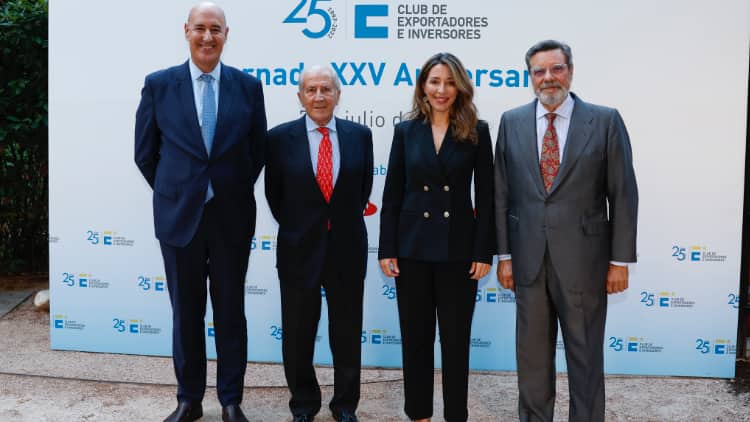The Diplomat
The Exporters and Investors Club insisted on Thursday in calling for structural reforms to improve the competitiveness of Spanish companies abroad. It did so through the mouth of its president, Antonio Bonet, at an event organised to mark the 25th anniversary of the Club.
The event, held at the Lázaro Galdiano Museum in Madrid, was attended by more than 150 representatives from the business, economic and institutional world, and Bonet was joined by the State Secretary for Trade, Xiana Méndez, and the Dean of the Cambridge Judge Business School, Mauro Guillén, who gave a keynote speech entitled “The new international business scenario.
In his speech, the President of the Spanish Exporters and Investors Club outlined the origins of the institution, which was founded in 1997 “with the aim of improving the regulatory environment, supporting internationalisation and facilitating networking and the exchange of experiences between exporting companies”, and had words of recognition and gratitude for its founder and current Honorary President, Balbino Prieto.
Antonio Bonet also recalled the transformation that the Spanish foreign sector has undergone in the last quarter of a century, going from representing 23% of GDP in 1997 to 35% today. Likewise, the stock of Spanish investment abroad has increased tenfold in this period, reaching almost 500,000 million euros, making Spain one of the countries in the world with the most direct investment abroad.
Bonet underlined the key role that exports of goods and services have historically played in overcoming economic crises, and pointed out that “the question we are all asking ourselves today is whether the foreign sector will continue to be the engine of growth in Spain”.
In his opinion, we have, as a fundamental condition, companies with a vocation for internationalisation and permanence in the markets. “They have already demonstrated this in recent years and continue to do so despite the difficult situation created by the pandemic and the war in Ukraine, but we need many more. In Spain there are only 59,000 companies that export regularly and of these only 25,000 sell more than 50,000 euros a year abroad,” he said.
For this reason, he considered it essential to have a regulatory environment and economic policies that facilitate the international competitiveness of our companies. “Today we are losing competitiveness, not only because inflation is higher than that of our main competitors, but also because the high deficit and public debt that we are suffering are leading us to tax rises, unless public spending and pensions are drastically rationalised,” he said.
For Antonio Bonet, the third condition for the foreign sector to contribute effectively to the recovery is to have efficient policies to support internationalisation. “It is not just a question of budgetary differences with other similar instruments in competitor countries, but also of agility in the management of some of them”. He also stressed that “companies are aware of the effort being made by the Administration in the difficult circumstances caused by the pandemic and the war in Ukraine”.
In his speech, Professor Mauro Guillén outlined the new international scenario in which Spanish companies will have to compete in the future, marked by several trends that are making rapid headway, such as a new map of industrial boundaries, changes in the supply chain, the advance of automation at all levels, the proliferation of remote work and demographic changes that are redrawing new fields of opportunity for business.
The conference was brought to a close by the State Secretary for Trade, who pointed out the importance of internationalisation for the economy and for companies: “There are many ways to be competitive but, without a doubt, for many Spanish companies, success and competitiveness is achieved by growing abroad”, she said.
Xiana Méndez underlined the importance of the Exporters’ Club as an “essential ally” for the Secretary of State for Trade due to its role in “promoting and improving the competitiveness of companies abroad”, as well as its capacity to “identify opportunities for Spanish companies”.
Likewise, the State Secretary recalled the “fundamental” role of the foreign sector in the 2008 crisis, and predicted that “in the coming years, due to its resilience, it will once again be key for our country”.







